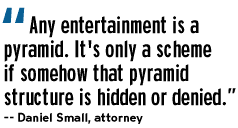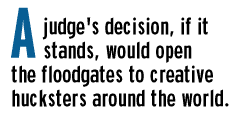| |||||||||

Risk taker? Try a fantasy market
 If betting on Nasdaq stocks isn't exciting enough for you,
now a Federal judge has legitimized "fantasy" Internet stock markets
that feature totally fake companies. If betting on Nasdaq stocks isn't exciting enough for you,
now a Federal judge has legitimized "fantasy" Internet stock markets
that feature totally fake companies. The Securities and Exchange Commission last June froze Estonian bank accounts worth at least $2.7 million. The agency said at the time that a fantasy Internet market called StockGeneration, based on the Caribbean island of Dominica, was defrauding thousands of naive investors. The company's Web site offered trading in 11 stocks that were purely imaginary, according to the SEC. One of the stocks, called Golden Nugget, was guaranteed to gain 10 percent a month. Compounded month by month, that gain would add up to 215 percent a year But U.S. District Court Judge Joseph L. Tauro of Massachusetts last month threw a wrench into the SEC's injunction. The "virtual stock exchange" wasn't unlawful, Judge Tauro wrote in his decision, because people visiting the Web site had been told "that they would be playing a game, not making an investment." This decision, if it stands, rises to the level of true genius. It opens the floodgates to creative hucksters around the world: • People dressed like doctors could give sugar pills instead of real medicine to sick children. It would all be OK, because the "doctors" were merely operating a Fantasy Hospital. • Scholarly types wearing black robes could issue master's degrees and Ph.D.'s at pretentious ceremonies. The degrees might be worthless, but who cares since the "scholars" were merely representing a Fantasy College.
• Executives in business suits could open a banking office, take customers' deposits, and then leave town with the money. No problem! They were merely running a Fantasy Bank In the case of StockGeneration, Judge Tauro was persuaded to rule against the SEC because of a novel legal argument. In an interview, the fantasy market's attorney, Daniel Small--a partner in the Boston law firm of Butters, Brazilian & Small--explained his client's theory: It's all right for an operation to be a pyramid, as long as it isn't a scheme.
The mother of all pyramids? Small notes that the StockGeneration site openly said, "We depend on more people coming in." He says, "Is it a pyramid? Yes, it's a pyramid of sorts. Is it a pyramid scheme? Absolutely not." This line of thinking was certainly attractive to hordes of people. In a press release announcing its victorious round in the case, StockGeneration claims to have enrolled 325,000 players from more than 70 different countries. It's actually possible that StockGeneration did attract that many investors, because hope springs eternal. Testimonials by optimistic investors spread the fantasy like wildfire. One player posted a Web page this past January proclaiming that he'd happily invested $3,000. His goal was to pyramid that into $27,000 so he could afford the fee for cryonic suspension. (You can't make this stuff up.) Unfortunately, the player soon posted a very disappointed message in April, announcing that he'd lost his entire $3,000 as part of "an elaborate hoax." Faced with mounting withdrawals, StockGeneration had just invoked "Rule 13." This permitted its executives--who simply invented the stock prices every day--to revalue $10,000 worth of shares down to $1. The resulting outcry from investors led to the SEC's injunction last June. Vowing to fight Judge Tauro's new decision, the SEC has appealed. While the case works its way through the courts, StockGeneration's funds remain frozen. In the meantime, if you want to lose money, here's a tip: Stick to the Nasdaq. Consumer advocate Brian Livingston appears at CNET News.com every Friday. Do you know of a problem affecting consumers? Send info to tips@BrianLivingston.com. He'll send you a book of high-tech secrets free if you're the first to submit a tip he prints.
on the soapbox |
|
|||||||||||||||||||||||
|
Send us news tips | Contact Us | Corrections | Privacy Policy |
|

